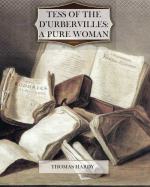|
This section contains 6,412 words (approx. 22 pages at 300 words per page) |

|
SOURCE: "Tess: A Less than Pure Woman Ambivalently Presented," in Texas Studies in Literature and Language, Vol. 28, No. 3, Fall, 1986, pp. 324-38.
In the following essay, Claridge argues that Thomas Hardy's subversion of Tess's sexual and psychological purity in Tess of the d'Urbervilles leads to that text's aesthetic incoherence.)
How strange that one may write a book without knowing what one puts into it—or rather, the reader reads into it.
—Thomas Hardy
Over the years many readers have tried to solve the problem of just what, finally, is wrong with Hardy's Tess of the d'Urbervilles. These same critics have commonly admitted the novel to the first ranks of our literary canon, but they nonetheless feel compelled to address the niggling question of "the flaw." Weaknesses singled out with some regularity include the heavy dependence upon coincidence, the "absurdity of Alec's conversion and deconversion," and the indubitable hypocrisy of...
|
This section contains 6,412 words (approx. 22 pages at 300 words per page) |

|


